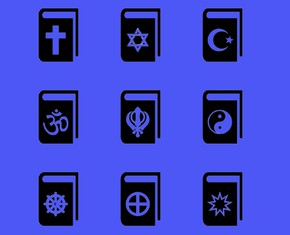The views expressed in our content reflect individual perspectives and do not represent the authoritative views of the Baha'i Faith.
The word religion carries connotations, holding entire levels of understandings within its multifaceted paradigm. Instead of abolishing the word religion, though, the Baha’i Faith completely reframes it.
In fact, religion itself undergoes a tremendous paradigm shift in light of the Baha’i writings—and in light of how millions of Baha’is from all over the world practice their Faith.
For Baha’is, religion is not an institutionalized, mechanical system of philosophy that dictates a sheer code of laws to be arbitrarily followed, or a superficial ancient mode of routinized, hidebound thinking seeping into our modern/postmodern era.
Instead, Baha’is understand that religion as a term needs to be revisited and revitalized. Therefore, the Baha’i teachings offer a new definition and a different vantage point. Abdu’l-Baha defined religion as “the truest philosophy” that builds “the only lasting civilization:”
… unless the moral character of a nation is educated, as well as its brain and its talents, civilization has no sure basis.
As religion inculcates morality, it is therefore the truest philosophy, and on it is built the only lasting civilization. – Abdu’l-Baha, Paris Talks, p. 31.
Of course, no government can legislate morality. Civil authority can only set laws and restrain the outward vices and criminal behaviors—but not when no one is looking. In other words, people will always find loopholes and circumvent the law, unless their inner moral standards prevent them from doing so. Religion, as opposed to mere governance, imbues people with a sense of morality—of what is right and wrong—and eliminates the outward and the inward behavior. Therefore, Baha’is believe that religion is essential for human growth:
… among the teachings of Baha’u’llah is that religion is a mighty bulwark. If the edifice of religion shakes and totters, commotion and chaos will ensue and the order of things will be utterly upset, for in the world of mankind there are two safeguards that protect man from wrongdoing. One is the law which punishes the criminal; but the law prevents only the manifest crime and not the concealed sin; whereas the ideal safeguard, namely, the religion of God, prevents both the manifest and the concealed crime, trains man, educates morals, compels the adoption of virtues and is the all-inclusive power which guarantees the felicity of the world of mankind. But by religion is meant that which is ascertained by investigation and not that which is based on mere imitation, the foundations of Divine Religions and not human imitations. – Abdu’l-Baha, Selections from the Writings of Abdu’l-Baha, pp. 302-303.
Yes, the Baha’i teachings say, the forces of religion—or at least the forces of corrupted religion—have divided people and caused wars:
It is true that there are foolish individuals who have never properly examined the fundamentals of the Divine religions, who have taken as their criterion the behavior of a few religious hypocrites and measured all religious persons by that yardstick, and have on this account concluded that religions are an obstacle to progress, a divisive factor and a cause of malevolence and enmity among peoples. They have not even observed this much, that the principles of the Divine religions can hardly be evaluated by the acts of those who only claim to follow them. For every excellent thing, peerless though it may be, can still be diverted to the wrong ends. A lighted lamp in the hands of an ignorant child or of the blind will not dispel the surrounding darkness nor light up the house—it will set both the bearer and the house on fire. Can we, in such an instance, blame the lamp? No, by the Lord God! – Abdu’l-Baha, The Secret of Divine Civilization, p. 71.
However, the Baha’i teachings also say that the gradual decline in religion, which happens to every Faith when its spiritual power begins to wane, generates the eventual release of a new, revitalizing Faith in its stead:
From the days of Adam until today, the religions of God have been made manifest, one following the other, and each one of them fulfilled its due function, revived mankind, and provided education and enlightenment. They freed the people from the darkness of the world of nature and ushered them into the brightness of the Kingdom. As each succeeding Faith and Law became revealed it remained for some centuries a richly fruitful tree and to it was committed the happiness of humankind. However, as the centuries rolled by, it aged, it flourished no more and put forth no fruit, wherefore was it then made young again.
The religion of God is one religion, but it must ever be renewed. Moses, for example, was sent forth to man and He established a Law, and the Children of Israel, through that Mosaic Law, were delivered out of their ignorance and came into the light; they were lifted up from their abjectness and attained to a glory that fadeth not. Still, as the long years wore on, that radiance passed by, that splendour set, that bright day turned to night; and once that night grew triply dark, the star of the Messiah dawned, so that again a glory lit the world.
Our meaning is this: the religion of God is one, and it is the educator of humankind, but still, it needs must be made new. – Abdu’l-Baha, Selections from the Writings of Abdu’l-Baha, pp. 51-52.
















Comments
Sign in or create an account
Continue with Googleor